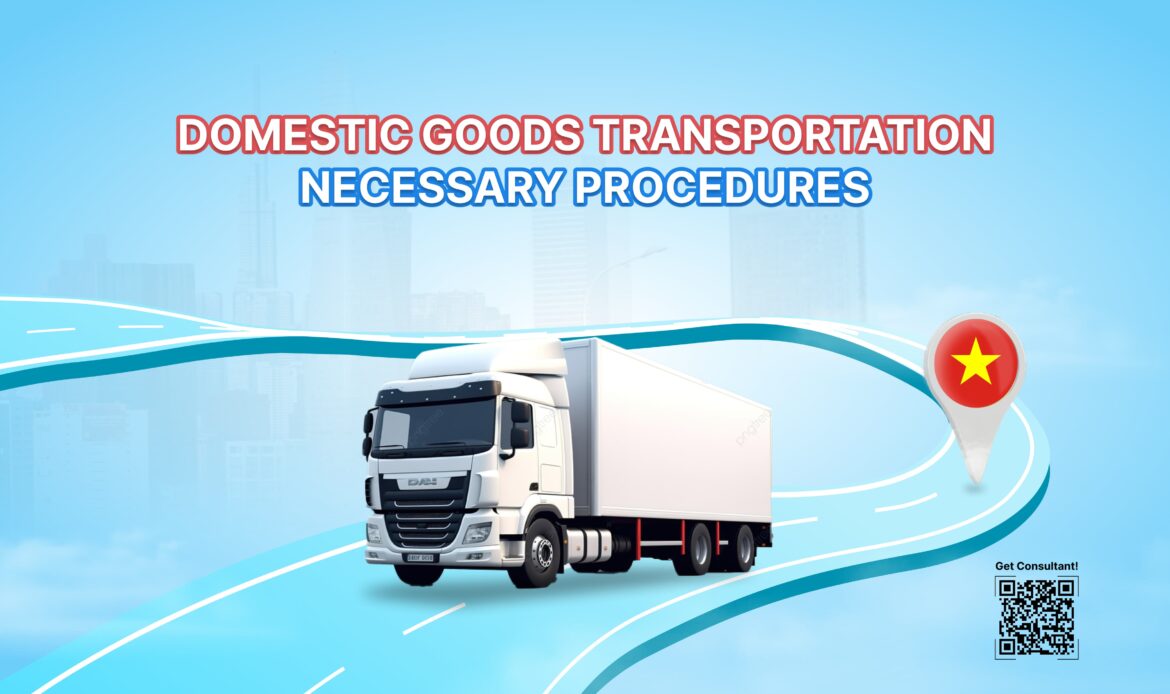Procedures for domestic transportation by road

Domestic transportation by road is the most common and flexible method in Vietnam, especially for Small and Medium Enterprises (SMEs). However, to ensure a smooth shipping process, mastering the procedures for road transportation is essential. Let’s explore with VELA the basic regulations to follow and important considerations to avoid legal risks when transporting goods by road.
1. Prepare all necessary shipping documents
One of the crucial procedures for domestic transportation by road is to prepare and present all relevant documents related to the goods. This is a mandatory step to ensure legal compliance and facilitate smooth customs clearance, avoiding unwanted risks such as cargo being held or administrative fines. The required documents not only verify the origin and quality of the goods but also protect the company in case of disputes.
-
- Commercial invoice: this vital document specifies details about the transaction between the seller and the buyer, including the value, quantity, and description of the goods. The commercial invoice is the basis for customs authorities to determine import or export duties.
-
- Packing list: this document provides detailed information about how the goods are packed, the number of packages, gross weight, and net weight of the goods. The packing list helps both the transport company and customs authorities easily inspect and compare the actual goods with the documents.
-
- Bill of lading: issued by the transport company, this document confirms the receipt of goods and guarantees delivery to the agreed destination. There are various types of bills of lading depending on the transportation mode (e.g., sea bill of lading, air waybill, road bill of lading).
-
- Certificate of origin: this document certifies the origin of the goods and is necessary for determining preferential import duties under Free Trade Agreements. It also ensures that the goods are not subject to import bans or quotas from the country of origin.
-
- Certificate of quality: this document certifies that the goods meet certain quality standards, usually issued by the manufacturer or an inspection agency. For safety-critical products such as food and pharmaceuticals, this certificate is highly important.
-
- Phytosanitary/veterinary certificate: for agricultural products, food, or animal-based products, this certificate is required to confirm that the goods have been inspected and are safe for public health.
-
- Customs clearance: this document must be submitted by the importer or exporter to customs authorities, providing information about the shipment, such as the type of goods, quantity, value, and applicable duties. It is required for customs clearance.
2. Regulations on transport vehicles
Vehicles used for domestic transportation by road must meet the technical standards set by law to ensure smooth operation on roads. Some important requirements to check before transportation include:
-
- Valid driver’s license: the driver must have a valid license corresponding to the type of vehicle being operated.
-
- Vehicle inspection certificate: the vehicle must have a valid and regularly updated inspection certificate to ensure road safety throughout the journey.
-
- Vehicle insurance: this is mandatory for all vehicles. Insurance helps mitigate risks in case of accidents during transportation.
3. Goods packaging regulations
Proper packaging not only ensures the safety of the products but also compliance with legal regulations. When packaging, transport companies should keep the following in mind:
-
- Goods must be carefully packed: Especially for fragile or hazardous items, proper packaging prevents damage during transportation.
-
- Clear labeling: All goods must have labels clearly indicating the product name, manufacturer, and origin. For flammable or explosive goods, appropriate warning labels are required.
4. Goods inspection procedures
Before being transported by road, goods must be inspected and certified by relevant authorities, especially for items requiring special handling, such as food or medical supplies.
-
- Inspection at the point of departure: drivers and companies should proactively inspect goods before starting the journey to ensure they match the descriptions on the documents.
-
- Inspection at traffic control stations: During transportation, goods may be inspected at control stations. Therefore, drivers must carry all necessary documents to ensure a smooth inspection process.
5. Professional domestic transportation by road services
To save time and ensure the safe transportation of goods, choosing professional logistics services is crucial. These companies not only provide transportation services but also assist businesses with the entire process, from packaging and inspection to document submission. Especially for goods requiring special handling or complex transportation, such as fragile, hazardous, or high-value items, professional carriers play a key role in ensuring safety and quality.
VELA offers domestic transportation by road solutions, helping businesses optimize their shipping and goods management processes. With a modern digitized system, VELA automates the entire process from packaging to inspection and delivery. This system allows businesses to easily track shipments, minimize errors, and ensure goods arrive safely and on time.
-
- Compliance with legal regulations: VELA ensures businesses are fully compliant with transportation regulations, including road tolls, customs inspection fees, and related taxes. For goods subject to strict taxes or inspections, VELA helps businesses review and prepare all necessary documents to avoid unexpected issues.
-
- Ensuring goods safety: with an intelligent transportation management system, VELA not only optimizes operations but also reduces the risk of damage or loss of goods.
Domestic transportation by road requires strict compliance with legal regulations. Mastering the transportation procedures not only helps businesses avoid legal issues but also ensures a smooth and safe shipping process.

